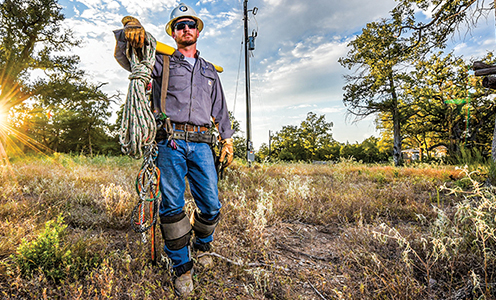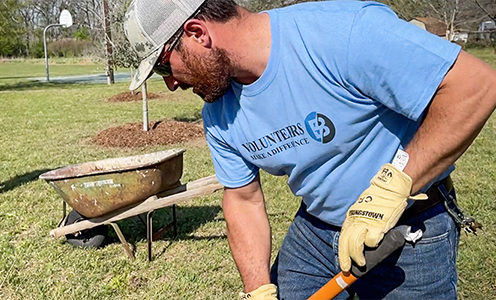Pam LeBlanc runs down a shady trail at McKinney Roughs Nature Park near Bastrop. The 1,140-acre park's trails are open to hikers, runners, horseback riders and mountain bikers. Sarah Beal photo
Sometimes, when I’m lacing up my shoes and contemplating a nice relaxing run, the thought of hitting neighborhood roads or community sidewalks makes me cringe.
The same old route? One more run on a surface so hot I feel like I'm trotting on a giant frying pan?
On those days, I fill up a few water bottles and head to the parks scattered around Bluebonnet Electric Cooperative’s service area. There, I can log my miles on softer dirt and gravel paths that blaze through fields, twist through forests and undulate over terrain far away from buzzing traffic.
The advantages to off-road running are many.
One, since you’re navigating uneven trails studded with rocks and roots, you’re planting your feet a little differently every time. That means less likelihood of repetitive motion injury (but a chance of tripping, so stay alert to prevent a fall).
Two, natural trails are softer than asphalt, which means less impact on your body. You’ll probably run at a slower pace, but that’s OK -— you’ll feel less beaten up afterward, too.
Three, it’s peaceful. You’ll hear chirping birds and rustling leaves. The scenery can lull you into a mellow mood. And if you ever decide to do a trail race, you’ll discover a less intense, more laid-back crowd of runners at your side.
Trail running takes more focus than road running. You can’t “zone out” the way you can on predictable paved routes. You have to pay close attention, lest you roll an ankle, step on a snake or whack your head on a low-hanging branch. But you get to scamper through nature like a feral beast, hopping rocks, zigzagging around roots and splashing through water on occasion.
I like all that, because it makes me feel like a kid again. You might, too.
To scout some of the best running routes in the Bluebonnet area, I enlisted the help of Joe Prusaitis, 64, a former race director who started the Central Texas-inspired Rogue Trail Series and the Tejas Trails race series. He also helped to create a trail running camp for military veterans with post-traumatic stress disorder. He’s got more than 350 races under his belt, including 27 100-milers, and he loves to run on trails. Plus, he’s fun company, and running’s always better when you’ve got a friend to share the trail.
“It’s just where my heart and soul is,” Prusaitis says when I ask why he prefers trails. “I don’t do it for fitness. I like who I am because of what I do, and I like to do this.”
Read on to learn about some of our favorite trail running spots — many of which will be shadier and cooler this time of year — in Bluebonnet Electric Cooperative’s region.
For decades, Pam LeBlanc, a Texas A&M University graduate, has written about fitness, adventure and recreation in Central Texas. Her work has appeared in Texas Monthly, Texas Highways, Texas Parks & Wildlife and Real Simple magazines, and in the Austin American-Statesman. She has competed in endurance canoeing, a marathon, half-marathons, triathlons and swimming events. She has found adventures across Texas, in Glacier National Park and in Fiji, Costa Rica, Portugal, the Galapagos Islands, the Caribbean, Switzerland and beyond.
SOME TRAILS TO TRY
Bluff Creek Ranch
537 Owl Creek Road
Warda, 9 miles south of Giddings
979-242-5894
$10 per person or $5 for ages 6-12
IF YOU GO
Most of the trails are twisty single tracks, with soft dirt- or pine needle-covered surfaces.
The course is one-way, so pay attention to your direction.
For $20, visitors can sleep on a cot in a bunkhouse at the ranch. Bring your sleeping bag; restroom, shower are downstairs.
FUN FACT
Pets are allowed, but must be under good voice control or leashed.
This working cattle ranch offers 8 miles of twisty trails that roll through patches of pine trees and hardwoods, a couple of open pastures, a dry creek bed and along a namesake bluff.
“Bluff Creek is a stimulating and multivariable set of trails,” Prusaitis says.
One-way trails, which are shared with mountain bikers, are marked by pink ribbons on the left. The ranch hosts running events, including the Dirty Dozen 12-hour race each February and the Wild Hare 10K, 25K, 50K and 50-miler each November.
If all that running makes you hungry, take note. Bluff Creek Ranch also sells all-natural grass-fed longhorn beef, either ground or in steaks, which you can order online.
Want to make a weekend of it? An on-site campground fronts a nice pond (swim at your own risk), and facilities include showers and restrooms. Or, you can pay $20 for a spot on a cot in the bunkhouse, located in the loft of the barn. Bring your own bedding.
Rocky Hill Ranch
578 FM 153
4.5 miles northeast of Smithville
361-548-5728
$10 per person per day; free for ages 12 and younger
IF YOU GO
The ranch is open 24 hours a day, every day (except during race events).
If you like to climb, check out Black Trac, which features two Texas-sized quad burners.
Camping is $15 per tent per night and $30 for RVs.
FUN FACT
Grey and Pam Hill opened Rocky Hill Ranch to mountain bikers and other trail users in 1993.
Like Bluff Creek Ranch, Rocky Hill Ranch offers a great network of trails open to both mountain bikers and trail runners. Start your run on this long, narrow slice of property with a gradual climb up a sometimes flower-speckled field beneath a slowly rotating windmill, then cut into thickets of trees and soft, pine needle-coated trails. The owners even staff water stations throughout the property.
At some point, everyone ends up on a trail named Fat Chuck’s Demise, which serves up hill after hill of loose gravel and rock. If you make it to the top, you’ll find a fake headstone dedicated to Chuck. Park owner Grey Hill said there is no Fat Chuck — the trail is named after someone who helped create it. But winded runners often take the opportunity to yell at the fictitious Chuck when they top the hill, anyway.
We’re sad to note the actual demise of an old wooden saloon at the property entrance, but in its place stands a covered pavilion, complete with showers and restrooms. Overnighting is an option, with a shady campground and plenty of picnic tables.
“Rocky Hill Ranch has been going strong for 20-plus years as a mountain bike ranch with some great running trails,” Prusaitis says. “The Tunnel of Pines and Avenue of Pines are beginning to age and thin, so it’s not quite the lush tree canopy it used to be, but it’s still fun.”
Each April, the ranch hosts the Hells Hills 10K, 25K, 50K and 50-miler, one of the oldest trail races in the area.
McKinney Roughs Nature Park
1884 Texas 71 West
Cedar Creek, 10 miles west of Bastrop
512-303-5073
$5; free for ages 12 and younger
IF YOU GO
Some trails are open to equestrians. If you encounter a horse, step to the side and stand quietly as it passes.
Pay the admission fee at the science center, where you can get information on plants and animals at the park.
For best views of the Colorado River, explore the Riverside and Cypress trails.
FUN FACT
Check out the huge pecan tree on Pecan Bottom trail on the north side of the park.
The nice thing about the trails at McKinney Roughs? They’re mostly dirt, without a lot of sharp limestone to shred your shins in case you trip and fall (not that you’d ever do that). If you like lots of punchy ups and downs, intermingled with flowy curves, here’s your spot.
One section unfolds along the Colorado River, which curls past in greenish swirls, then takes you up and over hills before dipping into thick woods. The trails are steep enough to crank up your heart rate, but not overly difficult. Keep an eye out for osprey and bald eagles while you roam the 1,100-acre park, operated by the Lower Colorado River Authority. The multiuse paths are directional, with bicyclists traveling one way and equestrians and hikers the other.
“McKinney Roughs has a wonderful set of trails with some great variety, fun hills and waterfront,” Prusaitis says. The Circus trail race takes place here each December.
Palmetto State Park
78 Park Road 11 South
10 miles southeast of Luling
830-672-3266
$3 for adults; free for ages 12 and younger
IF YOU GO
Some of the trail is on boardwalk, so be prepared to transition from dirt to wooden planks.
The park offers tent and RV camping, as well as fishing and swimming in the San Marcos River, which cuts through the property.
Keep an eye open. The park’s namesake is the tropical dwarf palmetto that grows there.
FUN FACT
Members of the New Deal’s Civilian Conservation Corps built many of the stone structures, including the group pavilion, in the 1930s.
I got familiar with Palmetto State Park while training for the 2019 Texas Water Safari, a 260-mile canoe race from San Marcos to the Texas Gulf Coast in 100 hours or less. We’d take out our canoe in this park, on the low-water bridge. But it’s not just about paddling the San Marcos River.
The park provides some shorter hiking and running trails that weave through clusters of the namesake dwarf palmetto plants, which make it look like something out of “Jurassic Park.” Link together 1-mile loops through Ottine Swamp, Mesquite Flats and along the San Marcos River, but brace for humidity and watch for snakes. The trail, at places, is an elevated boardwalk. Bonus? You can jump in the river to cool off after sprinting. And you can pitch a tent in the park campground.
Lake Somerville State Park
14222 Park Road 57
Somerville, 19 miles southeast of Caldwell
979-535-7763
$4 for adults; free for ages 12 and younger
IF YOU GO
Bring a swimsuit. After your run, you can take a dip in the lake.
Runners can access the open sections of the Railway from either the Birch Creek or Nails Creek sides of the park, but will have to turn back at the closed bridges about 5 or 6 miles in.
Campsites with electricity are $20 per night; those with water are $12 per night and tents are $10 per night.
FUN FACT
Bobcat, river otter, alligator, white-tailed deer, coyote and raccoons live in the park.
The 13-mile Lake Somerville Trailway, which connects the Birch Creek and Nails Creek units of this state park, has been closed for some time because of flooding, but park officials say that most of it was slated to reopen by the end of August. Two damaged bridges remain closed. Birch Creek and Nails Creek trails are mostly open now, they said, but the park is still closed to equestrian use.
Once the full trail opens, trail runners and birders looking for bald eagles will have access to long swathes of mostly flat terrain that traverses oak forest and pastureland, occasionally offering views of Lake Somerville.
Distance runner Fawn Simpson, who describes the trailway as one of her favorite places to log long training runs, said the pump-operated horse troughs on the trailway are good for dunking your head on hot days.
“The appeal for me is that it’s 13 miles long in one direction, so when I was doing ultras I could put in a good run out there,” Simpson says. “There are lots of places where it’s half in the woods on shady, pine needle paths, a few rocks, a few roots, then some wide open running through pasture spots. It’s so serene. Sometimes you’re by the water, and other times you’re just out in the open.”
Pack your endurance (and plenty of drinking water) for this one. Keep an eye out for the rarely seen resident alligator of Yegua Creek.
Bastrop State Park
100 Park Road 1A
Bastrop
512-321-2101
$5 for adults; free for ages 12 and younger
IF YOU GO
Bastrop’s 13 cabins date back to 1934-35, when they were built by the Civilian Conservation Corps during the Great Depression.
Take a break on your Lost Pines Loop run for the scenic view from Fehr’s Overlook, named after park architect Arthur Fehr.
Farkleberry Spur is great for morning bird watching, according to the park website.
FUN FACT
A portion of the historic Camino Real, an important Spanish travel route that helped colonize Texas, runs through the park.
Bastrop State Park Park, at 82 years old and 6,600 acres, has many miles of great terrain for trail running, with undulating spits of land that crisscross the park.
“What they have there is shaded and fun to run, but … there is less shade or distance on the back side,” Prusaitis says. Bring plenty of water, sunscreen and a wide-brimmed hat on cloudless hot days.
The park has seven trails that total 12.5 miles. From the park’s website (go to tpwd.texas.gov and search for Bastrop State Park) you can find both interactive and printable trail maps. Check with the park first to get the status of trails.
There are five trails of “moderate” difficulty, ranging from 0.3 miles to 1.7 miles. There are another 5 miles of “easy” walking and stroller paths.
Lost Pines Loop, at 4.3 miles, is the longest trail in the park, with hills and descents. Park officials advise you to bring plenty of water, snacks and sunscreen on that trail. Take a break for a scenic view from Fehr’s Overlook, named after park architect Arthur Fehr.
From May to September, bring your swimsuit for a post-run dip in the big oval swimming pool built in 1937 as part of President Franklin Roosevelt’s New Deal jobs program. It is operated by the Bastrop YMCA.
The park also offers all types of camping sites, or visitors can stay indoors in one of its historic cabins.
Buescher State Park
100 Park Road 1E, Smithville
512-237-2241
$5 adults; free for ages 12 and younger
The park has about 6 miles of trails, most fairly short. Two of them, CCC Crossover and Big Tree Trace, are suited for strolling. Roosevelt’s Cutoff, Pine Gulch Trail and Winding Woodlands Trail are open to walkers, runners or mountain bikers. The longest trail is Pine Gulch, listed as “challenging” at 3.5 miles.
Lockhart State Park
2012 State Park Road, Lockhart
512-398-3479
$3 adults; free for ages 12 and younger
Lockhart State Park offers about 3 miles of trails. The best for running are the Clear Fork Trail, with its views of the creek and some of the park’s biggest trees, and the Wild Rose Loop; if you enjoy hills, try Rattlesnake Run.
Pam LeBlanc’s
12 tips on trail running
Trail running isn’t the same as road running. It’s a little trickier but a lot more fun. Keep a few things in mind if you haven’t tried it before.
1. Invest in good trail running shoes with stiffer soles and lugged bottoms that will hold up in rough terrain.
2. Scan the trail about 6 feet ahead of where you’re running. Last-second changes in direction are tricky, so choose your line and stick with it.
3. Pay attention. Roots, rocks and uneven surfaces can ruin a good run. You must mentally focus more when you’re trail running than on pavement.
4. Watch your head, too. Low-hanging limbs can
cause injuries.
5. If you start to fall, try not to brace yourself with an arm, just go with the flow. You’ll probably just land in a bush, so roll with the punches.
6. Take shorter strides because trail surfaces can be uneven, slippery or more challenging than they appear.
7. Carry plenty of water, either in a hand-held bottle or in a small bottle on a waist belt. Use sunscreen.
8. Beware of the flora and fauna. Watch for snakes, poison ivy and stinging insects.
9. Carry your cell phone in a waterproof bag. (You might get to splash through a creek!)
10. If you wear a cap, consider wearing it backward so it doesn’t block your peripheral vision.
11. If you’re running someplace you’ve never been, bring a trail map.
12. Tell a friend where you’re going and when you expect to return.
Download this story as it appeared in Texas Co-op Power magazine »





